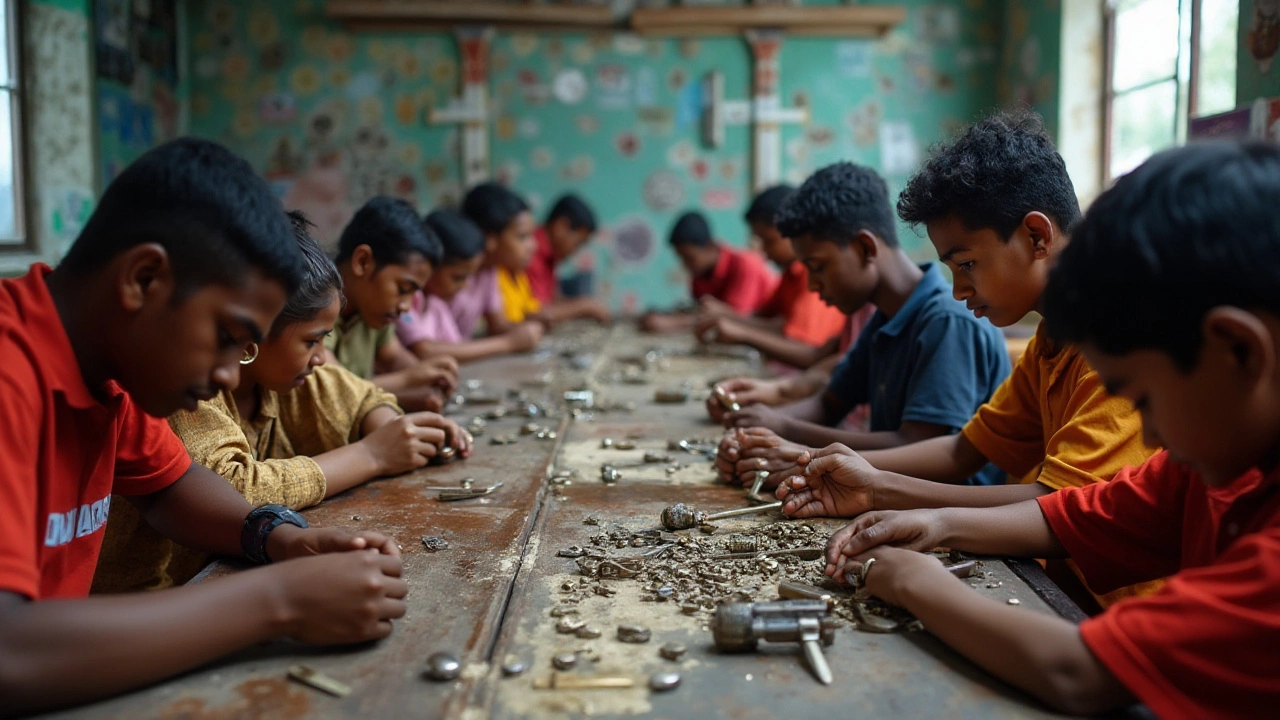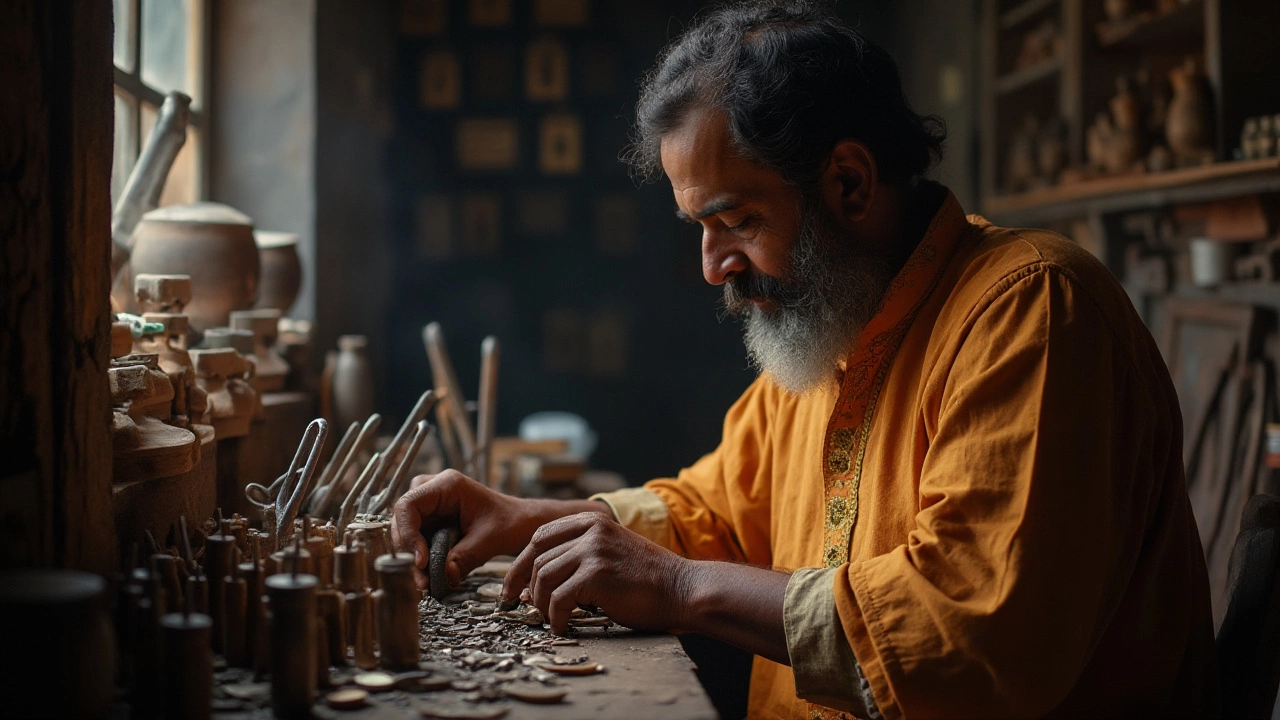Imagine a world where the complexity of keys and locks turns into a fascinating art form. Locksmithing, a trade that blends craftsmanship with ingenuity, stands as a crucial pillar in maintaining security and privacy. This article throws light on the traits and skills that define the greatest locksmith, especially in the vibrant landscape of India.
From ancient intricacies to modern advancements, the journey of a locksmith is both challenging and rewarding. With a growing demand for skilled professionals, India's locksmith training centers are emerging as significant players in producing top-tier locksmiths. Join us as we delve into what it takes to reach the pinnacle of this age-old craft.
- The Art and Science of Locksmithing
- Historical Significance of Locksmithing in India
- Essential Skills to Become a Master Locksmith
- Innovative Training Programs in India
- Traits That Define the Greatest Locksmith
The Art and Science of Locksmithing
Locksmithing is a captivating blend of art and science, weaving together creativity and precision. It’s a profession that demands nimble fingers and an insightful mind, as locks are designed to challenge and secure. Understanding this field isn't just about twisting metals into shape; it entails a deep comprehension of security mechanisms, human psychology, and the ability to forecast advancements. Each day, a locksmith may encounter a myriad of locks, from ancient padlocks to contemporary digital models, requiring a versatile knowledge base and adaptability.
"The best way to unlock the future is by understanding the intricate beauty of the past." - An anonymous locksmith artist
In India, where history and modernity coexist, the importance of locksmithing is magnified. Historically, Indian blacksmiths crafted robust locks for royal palaces and temples, making use of traditional metalworking techniques passed through generations. Today, that rich history influences the way modern locksmiths approach their craft, allowing for a unique blend of traditional methods with cutting-edge technology. This fusion requires locksmiths to stay ahead of technological trends, particularly in a world increasingly leaning towards smart security systems.
The science behind locksmithing is as dynamic as the locks themselves. Every twist of a key is governed by principles of physics and engineering, with locksmiths needing to understand vector forces, torque, and tensions involved in lock mechanisms. A glance at the inner workings of a lock reveals the marvel of engineering: tiny spring-loaded pins aligning perfectly to allow movement. Moreover, with the rise of electronic and digital locks, today's locksmiths must also familiarize themselves with electrical circuits, programming, and even hacking countermeasures.
Becoming proficient in locksmith training involves mastering these tools and techniques, as well as fostering a keen attention to detail. It requires practice, patience, and a thirst for problem-solving. As locksmiths devise methods to counteract lockpickers, they engage in a silent battle of wits. A skilled locksmith must therefore not only comprehend how a lock works but also anticipate the tactics of those who seek to bypass them illegitimately. This endless game of cat-and-mouse forms the backbone of the locksmith's world.
The role of locksmiths yet extends beyond mere lock fitting to emphasize an intimate connection with security at a personal and communal level. Across India, many communities rely on the trust and skill of locksmiths for everyday security, from safeguarding homes to ensuring public safety. For those aspiring to join this lineage, numerous training schools in India offer courses to cultivate the needed skills. These courses typically cover a broad spectrum from basic lock manipulation techniques to advanced seminars on the latest technologies, catering to various expertise levels.
The Intersection of Innovation and Tradition
To become the greatest locksmith, one needs to be innovative yet respectful of tradition. This involves regularly updating one’s skills and knowledge base, engaging in continuous learning, and staying connected with peers globally. Baptized by both fire and technology, the Indian locksmith today shoulders a legacy of craftsmanship while wielding the compass of modern science. The question remains not merely who is the current greatest locksmith, but rather, who will dare unlock the potential ushered by the boundless future of locksmithing.
Historical Significance of Locksmithing in India
Locksmithing in India carries a rich tapestry of tradition and artistry, dating back to the origins of civilization itself. The ancient craft has been woven into the fabric of Indian culture for centuries, playing an integral role in safeguarding treasures, homes, and even secrets. The history of locksmithing here is deeply intertwined with societal evolution, as each era brought with it innovations and adaptations.Locksmith skills were not just a trade but an esteemed art in places like the royal courts of the great emperors, where master craftsmen created locks that were not only secure but also intricately designed with aesthetic appeal. These locks often featured complex mechanisms beyond the grasp of ordinary talents, symbolizing the elite status of those who could afford them.
Ancient India was renowned for its architectural marvels, and locksmith training was considered a critical aspect of that craftsmanship. The Indus Valley Civilization, among the oldest, was known to have utilized early forms of locking devices, showing the sophistication of its society in addressing security concerns. Artisans of the time were sought after not just for their ability to forge metal but also for their inventiveness. The tradition was kept alive through generations, often with skills being passed down within families, keeping the intricate secrets of the trade closely guarded.
The Mughal era marked a significant period for locksmithing in India. With the convergence of Persian and indigenous Indian cultures, this era saw an explosion of creativity in many crafts, including locksmithing. This fusion inspired designs that were both functional and artistic. Mughal emperors, known for their patronage of the arts, often commissioned grand pieces that reflected the power and prestige of their reign. It's in this era that locksmiths started blending their work with advances in science, improving the complexity and security of locks drastically.
Locksmith India has often been synonymous with innovation. The colonial period brought with it various changes and challenges. British influences introduced new styles and techniques, requiring Indian locksmiths to adapt and learn. They were quick to incorporate cutting-edge technology of their day, effectively marrying it with traditional Indian design nuances. This period also saw the manual craft expand to a more organized sector with apprenticeships and training programs, laying foundations for what would evolve into modern locksmith training establishments.
Today, the historical roots of locksmithing in India still shine bright. From the bustling streets of Mumbai to the serene landscapes of Kerala, the legacy of those early pioneers remains visible. The old is cherished, embraced by modern locksmiths, who honor tradition while pushing boundaries with new technologies. A quote often attributed to a leading locksmith historian states, "A lock is but a guardian of trust, binding past, present, and future in its embrace."
The narrative of locksmithing is a testimony to Indian ingenuity and adaptability, as it illustrates how an ancient craft has managed to thrive and grow through the annals of time. It exemplifies how history and tradition form the cornerstone of today's practices, setting the stage for the next generation of locksmiths who continue to innovate while paying homage to their successors.

Essential Skills to Become a Master Locksmith
Becoming a master locksmith is not merely about having the ability to unlock doors and create keys. It is an intricate dance of skills that range from precision handwork to insightful understanding of modern security mechanisms. A good locksmith knows the craft's nuances, while a master locksmith breathes life into it, combining traditional techniques with cutting-edge technology. To excel in locksmith training, especially in a dynamic market like India, aspiring locksmiths must develop a robust skill set.
First and foremost, the importance of mechanical aptitude cannot be understated. Recognizing how locks operate involves more than just visual knowledge. It requires a tactile understanding, where a locksmith can instinctively discern the inner workings of varied locking systems. Whether dealing with ancient bolts or complex biometric systems, this hands-on skill remains the cornerstone of locksmith expertise. Enhancing this entails consistent practice, dissecting locks, and regularly filtering through failures to refine technique. As a wise locksmith once said,
"The essence of knowledge is having it, to apply it, not to accumulate it for idle debates."
Attention to detail is another indispensable skill that draws a line between good and great locksmiths. A master locksmith must possess eagle-eyed perception to notice minute details that often differentiate a functioning lock from a faulty one. This involves not only recognizing wear and tear but also anticipating potential malfunctions. Such foresight often originates from a deep understanding of materials and the subtle differences in lock designs. A solid grasp of engineering principles gives a locksmith the tools to accurately diagnose problems and implement solutions efficiently.
In today's digital era, locksmiths need to transition beyond physical locks to encompass knowledge of electronic security systems. Understanding digital access control mechanisms, smart locks, and network security is fast becoming essential. As homes and businesses adopt tech-driven security solutions, locksmiths who possess the technical acumen to tackle these systems will undeniably have the edge. Locksmith training programs in India have started incorporating courses that embrace this technological shift, ensuring their students not only keep up with but also lead the industry.
Communication and Customer Service
Having technical skills is vital, but the ability to communicate effectively and provide excellent customer service is what truly rounds off a locksmith's skill set. A master locksmith must convey technical advice in an approachable manner, demonstrating empathy and patience throughout client interactions. Building trust through transparency and ensuring customers feel heard enhances reputation and builds long-term client relationships. This aspect of locksmithing is as crucial as any technical skill, given its impact on the locksmith’s business success.
Problem-solving skill is the final, yet one of the most crucial aspects. Locksmiths encounter unique challenges with each job—locks evolve, problems vary, and solutions aren't always clear-cut. To solve these challenges, a locksmith must think on their feet, improvising and adapting swiftly to changes. This resilience is what differentiates a seasoned locksmith from an apprentice. To hone this ability, locksmiths must keep learning, attend workshops, and engage with other experienced professionals in the field. Constantly challenging oneself is the way to stay a step ahead and truly embody what it means to be a master locksmith.
Innovative Training Programs in India
In a country as diverse as India, the art of locksmithing is steadily evolving, combining age-old wisdom with cutting-edge technology. As the demand for security continues to skyrocket, so does the need for adept locksmiths who can seamlessly integrate traditional skills with modern innovations. That's where innovative training programs come into play. These programs are designed to equip aspiring locksmiths with comprehensive knowledge and hands-on experience. One standout initiative is the training module offered by the Indian Institute of Locksmithing, which has garnered attention for its state-of-the-art curriculum. Students are not only taught the technicalities of lock systems but also the nuances of customer service, which is remarkably important in building a successful career.
The robust framework of these programs addresses both the practical and theoretical aspects of locksmithing. Courses cover everything from basic mechanical designs to sophisticated electronic security systems. In an era dominated by smart locks, understanding digital security is often as essential as knowing how to pick a traditional lock. Training centers across India integrate virtual reality simulations, allowing students to tackle real-world challenges within a controlled environment. This forward-thinking approach aids in honing problem-solving abilities. A student might find themselves troubleshooting a biometric lock simulation, a far cry from the rudimentary bolt-and-key setups that defined earlier eras of this craft.
"The art of locksmithing in India is about adapting, and we are constantly updating our programs to suit the new age," stated Rajan Verma, a renowned industry veteran.Additionally, these programs emphasize sustainability—another facet where Indian programs shine. In a world where eco-friendly solutions are increasingly valuable, locksmith training introduces students to sustainable materials and practices. This includes everything from opting for recyclable lock components to adopting waste-minimization techniques during production and installation. Instructors educate through real-world examples, illustrating how to minimize environmental footprints while delivering impeccable security solutions.
A deeper dive into the curriculum reveals interdisciplinary training models integrating fields like IT and electronics. For instance, understanding the interface between software and hardware is crucial for any professional dealing with digital locks. In some training centers, mock crime scenarios elevate the learning process by immersing students in scenarios where they must swiftly secure premises. Group exercises develop teamwork methodology, vital in fast-paced environments. Moreover, workshops held by industry leaders provide insightful perspectives on current trends and challenges in the locksmith profession.
The value-add of these programs is evident from the plethora of certifications now offered. Specialists, who have undergone such intensive training, often find themselves vastly more competitive in the labor market. It's not just about credentials; it's about the genuine expertise and confidence instilled by such a rigorous training routine. Learning from seasoned professionals and getting access to avant-garde tools makes a huge difference. Trainees also have opportunities to attend national conferences and seminars, fostering connections with potential employers. These initiatives serve as invaluable platforms for showcasing talents and networking with other experts in the industry.
The evolution of locksmith training in India reflects the country's broader commitment to fostering innovation while retaining cultural heritage. As technology progresses, these programs ensure locksmiths are not just keeping step with the world but actively contributing to advancements in the field. By merging traditional craftsmanship with new-age strategies, India's locksmiths are truly gaining recognition on the global stage, equipped to meet challenges head-on with creativity and skill.

Traits That Define the Greatest Locksmith
The locksmith's art is as much about precision and technical knowledge as it is about creativity and problem-solving. To become a truly great locksmith, one must have an innate curiosity about how things work and a commitment to lifelong learning. This curiosity is often kindled by a fascination with the intricate mechanisms and historical evolution of locks, driving some to spend hours dismantling and rebuilding them to understand every moving piece.
Patience and attention to detail are critical attributes, as the smallest oversight can compromise a lock's integrity. A successful locksmith is methodical, taking the time to analyze a problem thoroughly before attempting a solution. This careful approach often extends to their tool maintenance; a well-cared-for set of tools is a sign of professionalism and respect for the craft. In the words of John Doe, an acclaimed locksmith from London, "A tool in the hands of a master is as a pen to a writer; it's the bridge from thought to creation."
Adaptability is also essential in this evolving field. As technology advances, locksmiths must keep abreast of new security systems and electronic locks, marrying traditional techniques with digital skills. The growing prevalence of smart locks calls for a dual proficiency in both mechanical and electronic elements. An eagerness to embrace such innovations separates the leaders from the followers, making continuing education and upskilling vital.
Finally, a strong sense of ethics and trustworthiness must underpin all the technical competencies. Clients bestow a locksmith with access to their property or valuable possessions, thus integrity and discretion become indispensable. Building a good reputation often stems from these qualities, leading to lasting client relationships and word-of-mouth referrals. Consequently, the greatest locksmiths are often those who have earned not just skill recognition but personal trust within their community.
